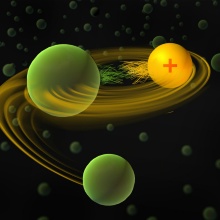In our recent paper, published in Phys. Rev. A, we study the stability of a single cold ion dipped into a bath of ultracold atoms, a so-called Bose-Einstein condensate. Such a hybrid system of a charged particle interacting with neutral atoms at low temperature constitutes an appealing approach to study impurities at the single-particle level and hosts prospects to realize new types of polarons. To this end, it is important to understand the stability of the ion as it can undergo chemical reactions with the atoms from the Bose-Einstein condensate.
Cold ion-atom reactions have largely been studied with ion traps that keep the ion in place. Our research team, led by Dr. Florian Meinert, has developed a very different approach allowing us to immerse a single cold ion into a Bose-Einstein condensate. Instead of preparing a trapped ion, we produce the ion directly from the ultracold bath by exciting one of the atoms to a highly excited Rydberg state, which is subsequently ionized by a sequence of fast electric field pulses.
Working in an environment which is shielded from electric stray fields allows us to keep the ion in place without a trap and observe its reaction dynamics. We find that the ion tends to rapidly form a charged molecule, a molecular ion, which is only very weakly bound. This allows us to apply electric fields to rip this molecule apart and by that extract information how strong the ion and the atom are bound together in that molecule. With the same technique, we also find that the molecule undergoes further collisions with the atoms making it more and more deeply bound, so-called ro-vibrational quenching collisions. These studies of the ion’s life in the condensate provide valuable insights for future studies aiming to investigate charged polarons at low temperature.


